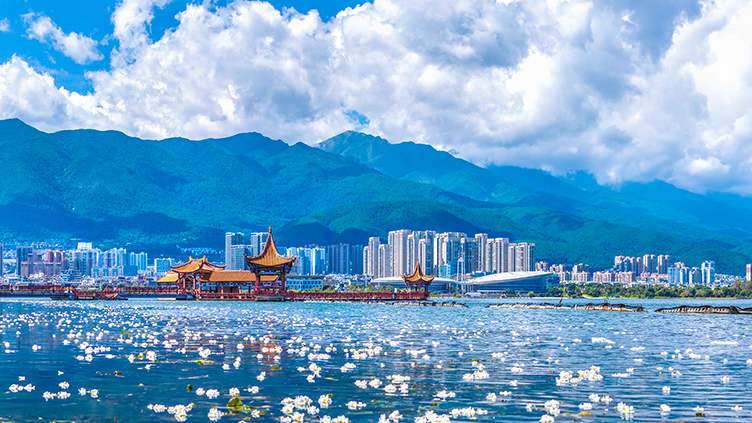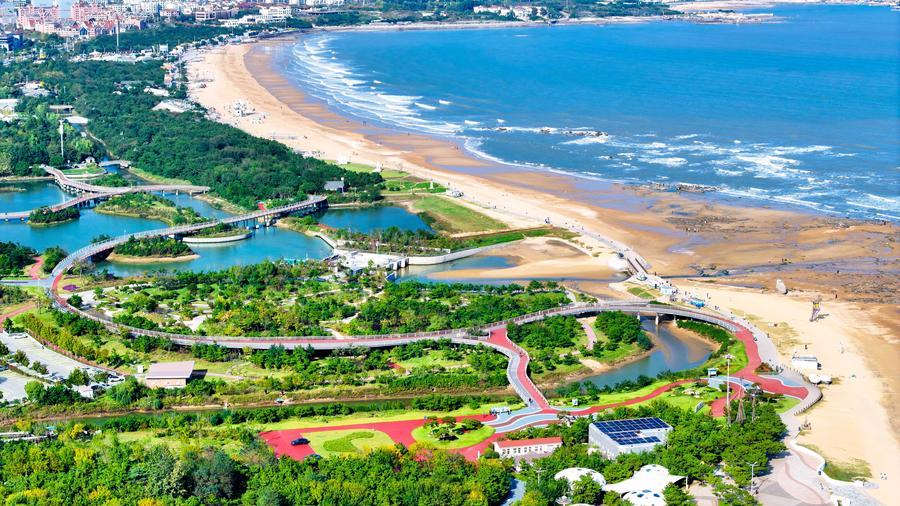China's space technology inspires Asia-Pacific youth
BANGKOK, Oct. 30 (Xinhua) -- At the recent Thailand Space Expo held in Bangkok, Thanabordee Sakunarunphet, a geoinformatics officer, pointed to a map on a large screen, showing areas prone to flash floods across Thailand, to demonstrate the importance of space data in keeping people safe during harsh weather conditions.
This visualization is part of space-based applications that Thanabordee and his team developed at the Thai Geo-Informatics and Space Technology Development Agency (GISTDA), which covers areas such as disaster monitoring, health tracking, and land use.
His ability to create such critical applications is rooted in a pivotal educational experience, which is the Sirindhorn Center of Geo-Informatics Master Program, a double-degree scholarship. As a recipient of this scholarship, he has spent one year studying surveying engineering in China's Wuhan University, experiencing the flourishing technological and personnel exchange between the two countries.
In a recent interview with Xinhua, Thanabordee emphasized how exposure to Chinese technology enhanced his understanding and capabilities. "The technology in China, particularly in surveying engineering, differs from ours," he said. "Because China has many of its own multi-system satellites, using this data for analysis is more progressive and easier than when we rely on limited data in Thailand."
He added that this experience now allows him to provide critical input on what sensors or types of satellites Thailand needs to develop next, helping to advance the national space program.
The focus on human capital development extends beyond bilateral university agreements, finding robust support through multilateral frameworks such as the Asia-Pacific Space Cooperation Organization (APSCO).
Tatiya Chuentragun, deputy director general of the Department of Program Operation and Data Service at APSCO, emphasized that China plays a massive role in supporting human resource development within the organization.
APSCO, which includes Thailand among its eight member states, is headquartered in Beijing. The organization provides full scholarships, both at the master's and Ph.D. levels, for students from member states.
Tatiya said China's deep expertise in space science, technology, applications, and policy means that APSCO members benefit from unparalleled access to highly qualified professors and experts for training and consulting.
"We are surrounded by abundant space resources and opportunities," Tatiya told Xinhua, adding that the access granted through APSCO makes reaching advanced space technology "easier and not as expensive as previously thought."
In February this year, Pakistan, another APSCO member, signed an agreement with China in Islamabad to select and train Pakistani astronauts for participation in China's space station missions, marking a new chapter in bilateral cooperation on manned spaceflight.
"China's manned space technology is among the most advanced in the world," said Muhammad Yousaf Khan, chairman of the Space and Upper Atmosphere Research Commission of Pakistan. "What's even more impressive is that China built a world-class space station in such a short time. This cooperation will surely inspire young Pakistani talents to make greater contributions to our space program."
China's progress in space has also fueled enthusiasm among young Malaysians. At the 17th Langkawi International Maritime and Aerospace Exhibition (LIMA) held in May, aviation enthusiast Zulhafiq Izwan, who traveled from Kuala Lumpur to attend, said that as China's innovation capacity continues to grow, his interest in Chinese-made equipment has deepened. "Chinese products are fascinating and innovative, with broad application prospects," he said.
As one of the Chinese commercial space companies actively engaging in cooperation with Thailand, GalaxySpace established a satellite communication ground station at Mahanakorn University of Technology (MUT) in May 2024 and completed successful tests.
Panavy Pookaiyaudom, president of MUT, said that cooperation with Chinese commercial space companies has provided valuable research and training opportunities for the university's teachers and students, while also exposing them to cutting-edge technologies in low-orbit communication satellites.
"We hope that one day, universities and research institutions in Thailand will be able to develop low-orbit communication satellites as advanced as those in China," he said.
Photos
Related Stories
- Chinese defense minister meets Mongolian, Lao counterparts
- Sound China-Pacific Island cooperation won’t be undermined by external noises
- Chinese FM meets president of Asia Society
- China slams U.S. attempts to turn Asia-Pacific into "powder keg"
- China willing to expand all-round cooperation with ADB: Chinese premier
- China refutes negative remarks from U.S.-Japan-ROK trilateral meetings
Copyright © 2025 People's Daily Online. All Rights Reserved.









